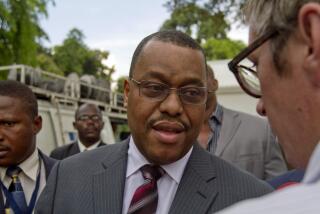THE CARIBBEAN : A Haitian Vote for Peace--and One-Party Rule?
- Share via
ST. MARC, Haiti — Haitians go to the polls Sunday to elect a president, providing what supporters term a success story for multinational peacekeeping efforts.
The elections could mark the first time in more than a generation that Haitians will replace one democratically elected president with another.
A peaceful transition would be a triumph for the U.S. armed forces who restored President Jean-Bertrand Aristide to office last year, ending a three-year military dictatorship, and the U.N. troops who have kept order since. Foreign soldiers are to leave shortly after the new president is inaugurated in February.
Still, Haitians themselves seem bewildered as they plan to dutifully, though reluctantly, vote for the man who will replace the president most wish they could keep. And critics warn that the election--far from being proof that democracy has been restored here--could be the beginning of a one-party dictatorship.
Rene Preval, 51, an agronomist, former bakery owner and the candidate of Aristide’s Lavalas Party, is expected to win in a landslide against 13 other candidates--all men.
But his would be a victory without a mandate, analysts say, based almost entirely on the Haitian masses’ love for Aristide--who is forbidden by the constitution to run again--and Preval’s promise that, if he is elected, the two men will govern arm in arm.
“People will vote for [Preval] only because he and Aristide are friends, because they trust Aristide,” said Civil Thertulien, 24, a correspondent for the popular national station Radio Luminerie in this coastal town. St. Marc is about a two-hour drive north of the capital, Port-au-Prince, and was one of the final campaign stops for front-runner Preval.
Under banners proclaiming “Preval for President; Five More Years for Lavalas,” he jogged through the streets in a blue baseball cap. A caravan of people honking car horns, riding bicycles and chanting “Preval, do what you want, the country is yours!” followed him to the town park. There, he climbed on the hood of a waiting car and, speaking through a megaphone, began a litany, “Where are you supposed to meet me Dec. 17?” The crowd shouted back, “At the polling place!”
The reception was a sharp contrast to the political climate two weeks ago, when many Haitians did not recognize Preval’s name. “We will vote for the table,” one stevedore at the port had said then, referring to the Lavalas Party logo, a crucial identifying symbol in a country where most people cannot read.
The voters’ strong identification with Lavalas--and the party’s ability to generate fast support for its candidate--worries some critics.
“Some opposition political leaders and analysts accuse Lavalas of being the greatest threat to democracy in Haiti--not because it does not represent the popular majority, which most concede, but because it does not respect the rights of the minority,” said a preelection report by the International Republican Institute, a think tank funded mainly by the U.S. Republican Party.
The institute also noted that the major opposition parties, by refusing to participate in the election, have contributed to the erosion of their political role.
But other observers caution against exaggerating the danger that a one-party system will emerge, based on a single election.
“Many democracies at various stages of development see a large victory by one party or another,” said U.N. spokesman Eric Falt. “That’s part of the game. It is no secret that Aristide and Lavalas are the choice of the people right now.”
Preval clearly plays on that popularity. “Aristide remains a citizen and very important political leader of Haiti after Feb. 7,” he said in an interview this week. “Certainly he will have a role to play. He frequently gives me advice. I consult him often.”
For his part, Aristide has refrained from using his popularity to openly campaign for Preval. “I am calling for respect and unity without denying where the president is regarding his political party,” Aristide said at a news conference with foreign journalists Thursday. “Lavalas is my party. Clearly I will support my party.” Asked about Preval directly, the president refused to mention him by name.
Still, opposition candidates have accused Aristide--without proof--of channeling government money into Preval’s campaign. Preval has more money to spend than other candidates. As supporters waited for him to arrive here, campaign aides handed out plastic bags, 1996 calendars and posters with his name and picture--and the Lavalas logo.
Much of his financial support appears to come from Haitians in America and Canada.
More to Read
Sign up for Essential California
The most important California stories and recommendations in your inbox every morning.
You may occasionally receive promotional content from the Los Angeles Times.













